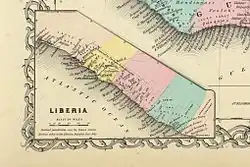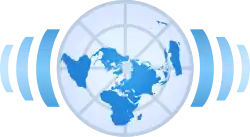Portal:Liberia
The Liberia Portal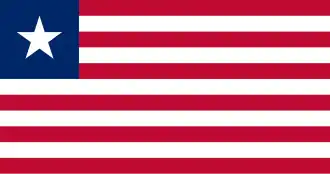 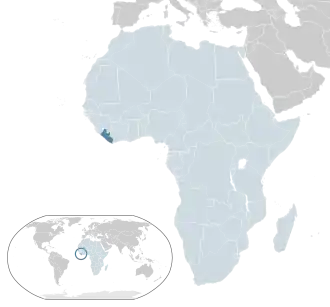 Liberia, officially the Republic of Liberia, is a country on the West African coast. It is bordered by Sierra Leone to its northwest, Guinea to its north, Ivory Coast to its east, and the Atlantic Ocean to its south and southwest. It has a population of around 5.5 million and covers an area of 43,000 square miles (111,369 km2). The official language is English. Over 20 indigenous languages are spoken, reflecting the country's ethnic and cultural diversity. The capital and largest city is Monrovia. Liberia began in the early 19th century as a project of the American Colonization Society (ACS), which believed that black people would face better chances for freedom and prosperity in Africa than in the United States. Between 1822 and the outbreak of the American Civil War in 1861, more than 15,000 freed and free-born African Americans, along with 3,198 Afro-Caribbeans, relocated to Liberia. Gradually developing an Americo-Liberian identity, the settlers carried their culture and tradition with them while colonizing the indigenous population. Led by the Americo-Liberians, Liberia declared independence on July 26, 1847, which the U.S. did not recognize until February 5, 1862. Liberia was the first African republic to proclaim its independence and is Africa's first and oldest modern republic. Along with Ethiopia, it was one of the two African countries to maintain its sovereignty and independence during the European colonial Scramble for Africa. Early 20th century Liberia saw large investment in rubber production by Firestone Tire and Rubber company. These investments led to large-scale changes in Liberia’s economy, work force, and climate. During World War II, Liberia supported the U.S. war effort against Nazi Germany and in turn received considerable American investment in infrastructure, which aided the country's wealth and development. President William Tubman encouraged economic and political changes that heightened the country's prosperity and international profile; Liberia was a founding member of the League of Nations, United Nations, and the Organisation of African Unity. In 1980, political tensions from the rule of William Tolbert resulted in a military coup, marking the end of Americo-Liberian rule and the seizure of power by Liberia's first indigenous leader, Samuel Doe. Establishing a dictatorial regime, Doe was assassinated in 1990 in the context of the First Liberian Civil War which ran from 1989 until 1997 with the election of rebel leader Charles Taylor as president. In 1998, the Second Liberian Civil War erupted against his own dictatorship, and Taylor resigned by the end of the war in 2003. The two wars resulted in the deaths of 250,000 people (about 8% of the population) and the displacement of many more, with Liberia's economy shrinking by 90%. A peace agreement in 2003 led to democratic elections in 2005. The country has remained relatively stable since then. Mining in Liberia has been a significant economic driver since the 1960s, though it largely stopped during the Liberian civil wars. Since the end of the civil wars, mining activity increased with emphasis on industrial mining. Mining has also led to concerns about environmental degradation and environmental destruction such as deforestation, water pollution, and air pollution. Industrial miners' poor wages, working conditions, and living conditions have sparked protests from the beginning of the Liberian mining industry continuing to today. (Full article...) Selected article -Joshua Milton Blahyi (born 30 September 1971), better known by his nom de guerre General Butt Naked, is a Liberian preacher and philanthropist best known for being a warlord during the First Liberian Civil War. Born in Monrovia into a Krahn family, Blahyi claims that at the age of seven he was inducted as a priest into a secret society and participated in child sacrifices along with assisting the regime of President Samuel Doe. Such claims have been disputed by Blahyi's relatives, who instead claim he dropped out of school after the third grade and worked at a local market in Monrovia before turning to crime. In 1989, the National Patriotic Front of Liberia (NPFL) rebel group invaded Liberia from the Ivory Coast to topple Doe, who was murdered in 1990. In c. 1993, Blahyi joined the United Liberation Movement of Liberia for Democracy (ULIMO), which had been formed in 1991 and fought against the NPFL. He raised his own militia of mostly child fighters known as the "Naked Base Commandos", and became known for going into combat wearing no clothing, which led to him adopting his nom de guerre. In 1994, ULIMO split into the rival ULIMO-K and ULIMO-J, and Blahyi backed the latter faction, resisting an attempt by the NPFL and ULIMO-K to arrest its leader Roosevelt Johnson in April 1996. Blahyi claimed to have experienced a vision of Jesus in July 1996 and abandoned his unit, deserting ULIMO and turning to street preaching. In 1997, the war ended and NPFL leader Charles Taylor was elected president. Blahyi fled to a refugee camp in Ghana in 1999 to escape persecution by Taylor's administration. There, Blahyi learned to read and write and began delivering sermons, founding a ministry and rehabilitation programme. He returned to Liberia in January 2008 to testify before the Truth and Reconciliation Commission, becoming the first former Liberian warlord to do so. His testimony sparked mixed reactions among the Liberian public but resulted in Blahyi achieving global fame, being featured in several documentaries and inspiring a character in the 2011 musical comedy The Book of Mormon. Many of Blahyi's claims about his life and rehabilitation programme have come under scrutiny, in particular the number of deaths he was responsible for during the war. (Full article...) Did you know -
More Did you know (auto generated)
Selected image -General images -The following are images from various Liberia-related articles on Wikipedia.
CategoriesSelect [►] to view subcategories
Liberia Liberia-related lists Buildings and structures in Liberia Culture of Liberia Economy of Liberia Education in Liberia Environment of Liberia Geography of Liberia Government of Liberia Health in Liberia History of Liberia Organizations based in Liberia Liberian people Politics of Liberia Society of Liberia Liberia stubs TopicsCities and townsRelated portalsWikiProjects
Associated WikimediaThe following Wikimedia Foundation sister projects provide more on this subject:
SourcesDiscover Wikipedia using portals
|

.jpg)

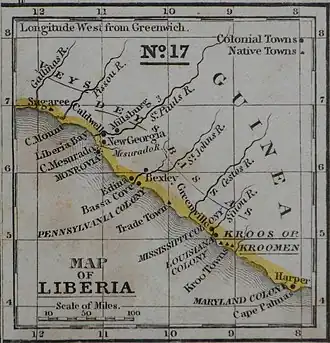
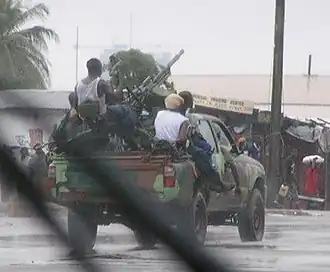
_Liberia._Money_Trees.jpg)
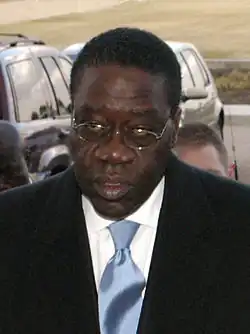
.svg.png)
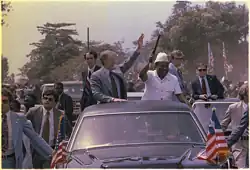
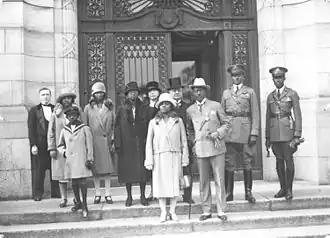
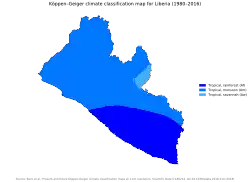
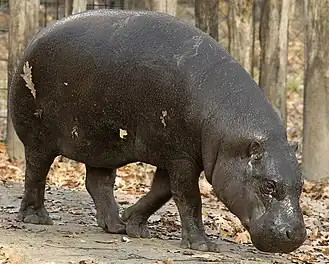
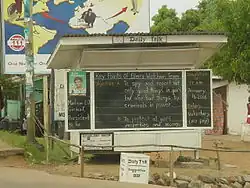
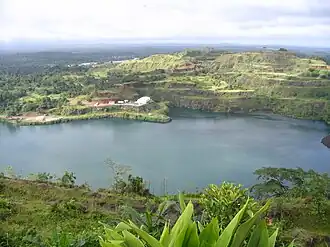
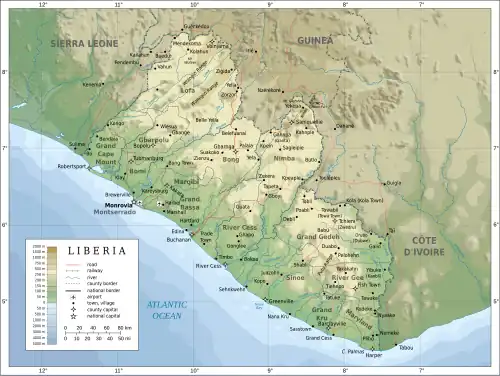
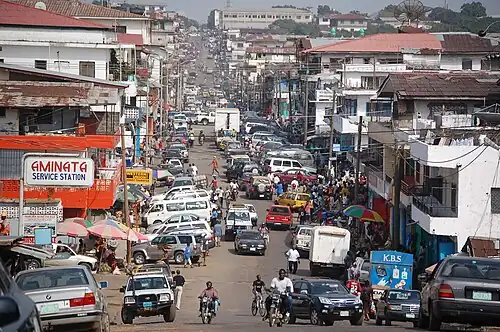
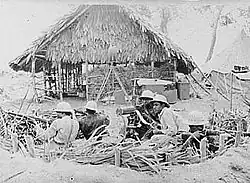
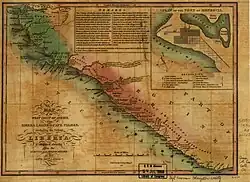
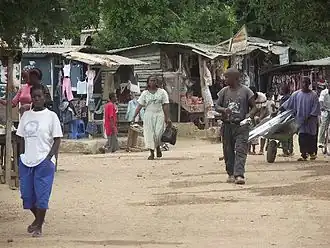
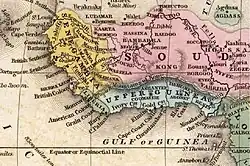
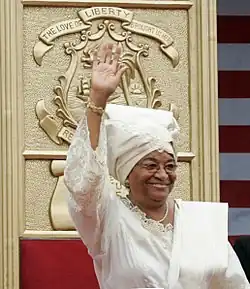


_Departure_of_colored_emigrants_for_Liberia_-_The_Illustrated_American%252C_March_21%252C_1896.jpg)
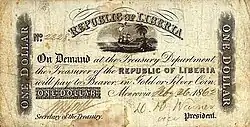

.jpg)
.jpg)
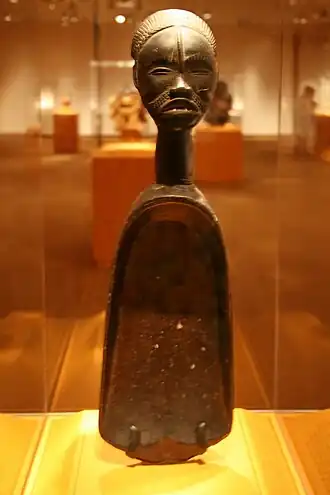
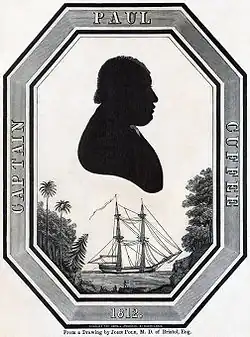
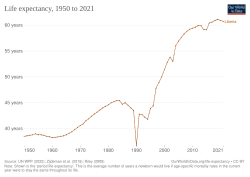
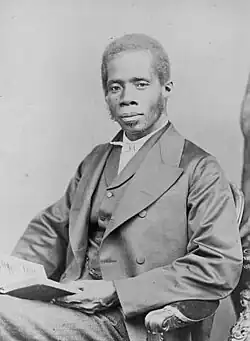
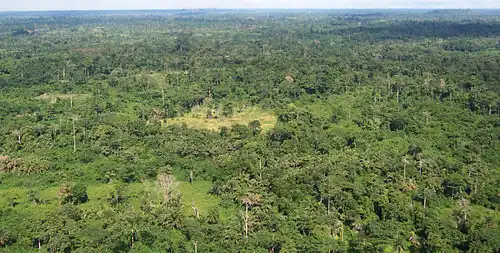
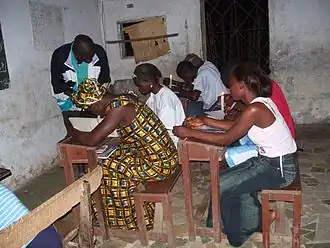
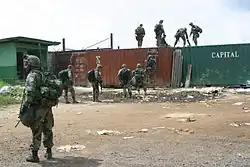
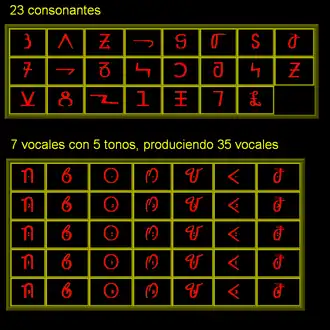
_Residence_of_Joseph_Roberts%252C_President_of_the_Republic_of_Liberia.jpg)
